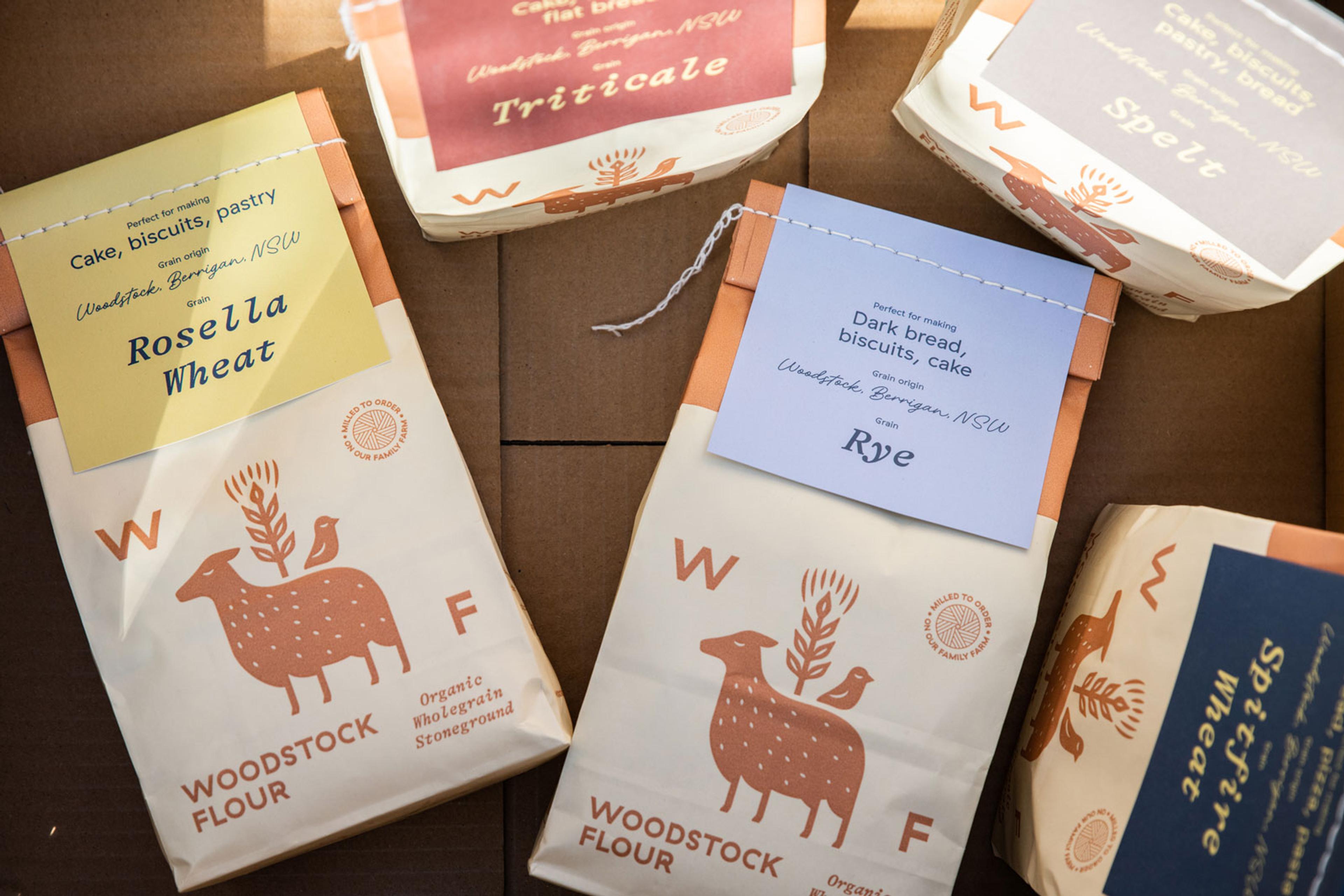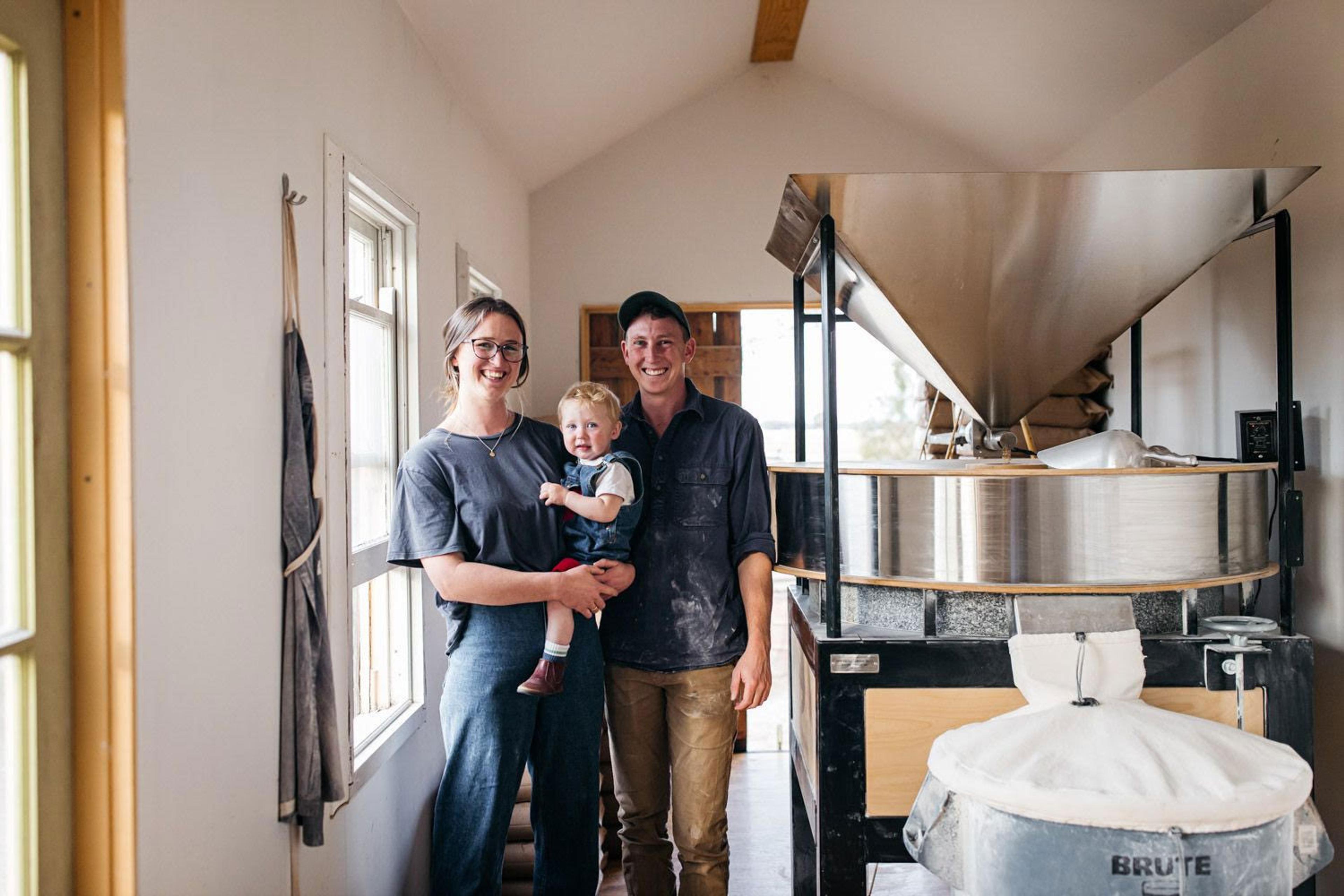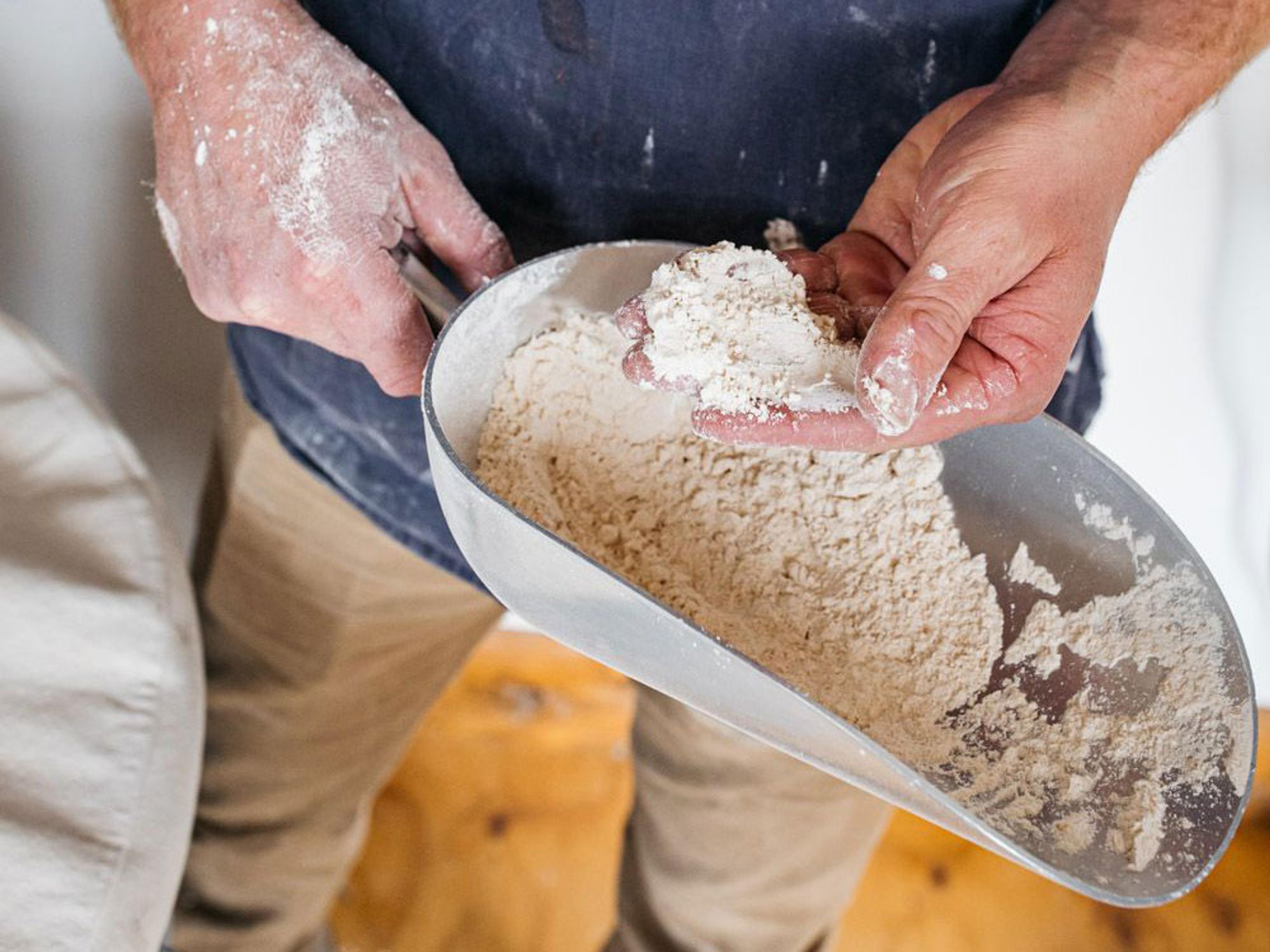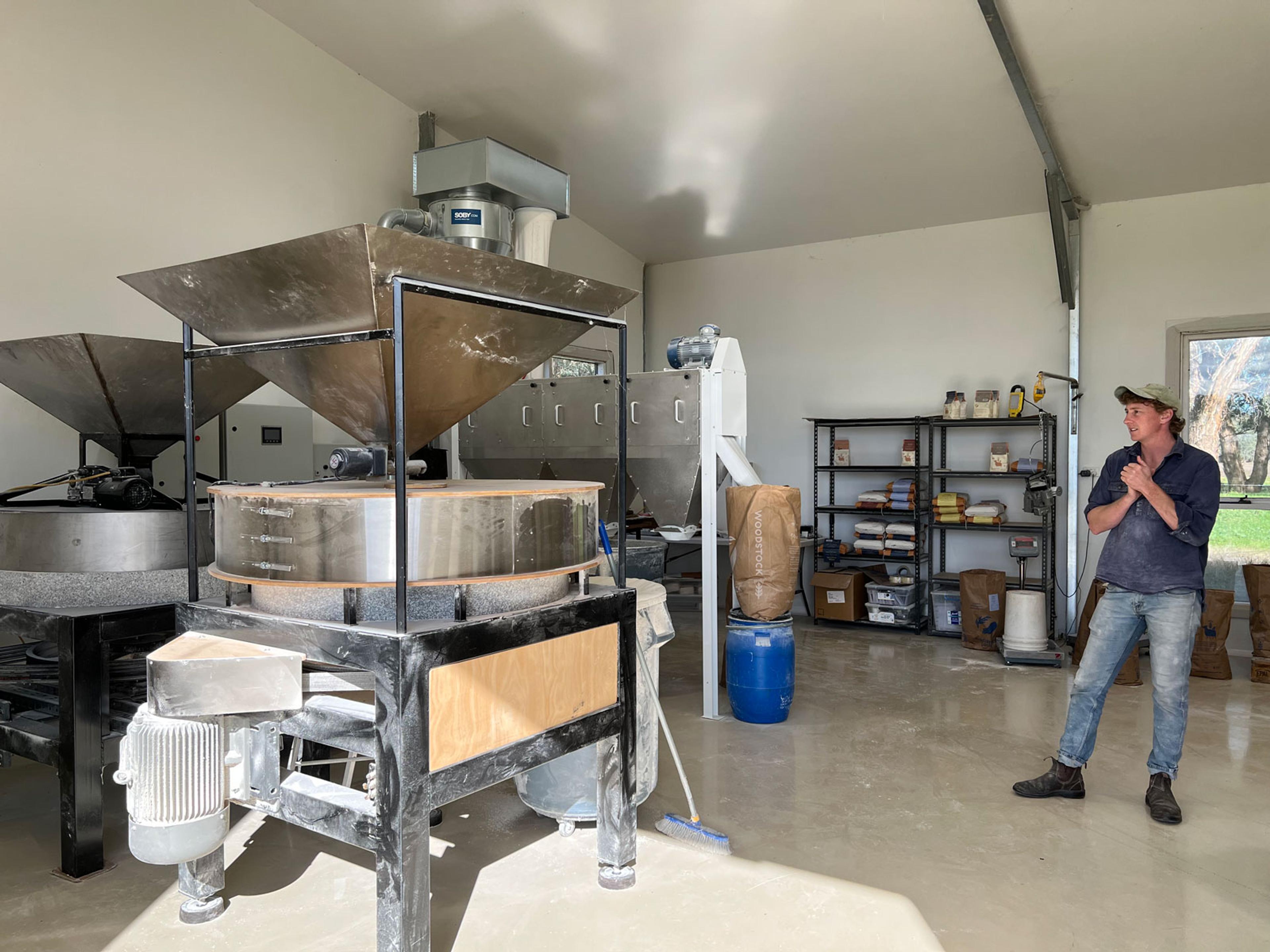Woodstock Flour is Baking the World a Better Place
In 2022, Woodstock Flour applied for funding from Sustainable Table for a new flour sifter to help grow the impact of their small-scale regenerative flour business. At the time, there was debate within our organisation about whether or not we should fund infrastructure for private businesses. However, after much listening and learning, we realised that farmers have enough on their plate growing our food and thoughtfully stewarding the land, all while battling a climate crisis. They should not have to shoulder the burden of setting up processing facilities, distribution and logistics, marketing channels and everything in between. They should not have to bear the cost of training that supports them to heal the land, after years of neglect and abuse at the whims of industrial agriculture.
To put it plainly, the transformation of Australian food and farming just isn’t possible without the right infrastructure in place and we need all hands on deck to make it happen. Governments, philanthropists and investors each have a role to play. There is much work to be done.
Consequently, Sustainable Table went ahead and approved funding for Woodstock Flour’s sifter and here we share the story of the impact this has had.
The Story Behind Woodstock Flour
Based in Rutherglen in Northeast Victoria, Woodstock Flour is a small family business that is growing and milling grain for their local community. Courtney and Ian met at university while studying environmental science and then transitioned into careers in conservation. Despite Ian having grown up on his family farm in Berrigan and Courtney’s father being an oyster farmer, it took them a while to connect the dots and realise that farming had the potential to bring about the positive environmental change they had both studied and worked for.
The couple recognised that they could potentially find a way into farming by selling the organic grain from Ian’s family farm directly to customers and businesses. “Ian's always been very proud of the grain that they grow and it's really good quality,” shares Courtney. At the time, many first-generation farmers were building new and innovative businesses selling vegetables and meat direct-to-market but nobody was selling flour. To test the waters they sourced a tiny kitchen stone mill and quickly discovered there was a lot of interest in their products at farmers markets across Melbourne.
Growing the Business
Although the flour they were producing at the time was relatively poor quality, the response from bakeries and eaters gave them the confidence to invest in a commercial stone mill. They decided to produce wholegrain, stoneground flour for its enhanced flavour and nutritional value. From here, Courtney and Ian were able to grow the business and start supplying to a number of bakeries who became enthusiastic Woodstock Flour champions. With the increase in demand, they soon reached capacity and with the savings from the business they were able to put down roots and purchase their first small farm in Rutherglen.
Ian and his brother, Hamish, built a second flour mill on the farm in a similar style to the original, however this time around they were able to source materials closer to home. Many of the people they spoke with and sought advice from told them it wasn’t possible and that they needed to import specific equipment. The brothers were determined to prove them wrong. “We're very passionate about seeing grain appreciated and grown locally, but then to be importing equipment felt at odds with our ethos. It felt really good to be using locally sourced Victorian granite and working with local fabricators,” Ian commented.
“We're very passionate about seeing grain appreciated and grown locally, but then to be importing equipment felt at odds with our ethos. It felt really good to be using locally sourced Victorian granite and working with local fabricators."
Creating a Product for the Local Community
With the two mills in operation, Courtney and Ian began to notice that most of the wholegrain flour they were producing was making its way to Melbourne, rather than being consumed by local customers. As owners of a business that prides itself on sourcing and producing locally, this didn’t sit right with them. They realised that their community in the region preferred white flour over wholegrain, which wasn’t organic and had to be shipped in from interstate as there was no Victorian white milled flour available. Courtney and Ian saw this as an opportunity to expand their product range to provide local bakeries with a regenerative white flour.
There was just one hurdle. To produce a high extraction white milled flour, which maintains much of the flavour and nutritional value of wholegrain flour, Courtney and Ian would need another piece of equipment - a flour sifter. Unfortunately, this would mean a substantial investment that at the time was out of reach for the couple. They tabled the idea and decided it would be a long-term goal to work towards.
Luckily, the chance to apply for funding from Sustainable Table arose and Courtney and Ian jumped at it. With coaching from one of the Sustainable Table’s advisors, they applied and successfully received $50,000 for the new sifter.
Change Takes Time
Over the last 18 months, Courtney and Ian have worked hard to set up the sifter, a process that was more time-consuming and costly than expected. They experimented with this new piece of equipment and tested their new white flours with their favourite bakers.
Plain and Bakers flour are now available to purchase on their website and they are slowly growing the demand for their new products. While they have been working with a few local restaurants and small-scale bakeries, the couple are still committed to securing support from more local bakeries and home bakers. Shifting mindsets and behaviours is a long-term goal and they recognise that it’s going to take some time to grow their local customer base, especially during a cost-of-living crisis when so many bakeries are already struggling.
Nevertheless, Woodstock Flour’s regenerative flour products continue to sell well further afield. In the last six months, they have sold $25,000 worth of high-extraction flour to their wholesale accounts and over $5000 in online sales. and in the next year. The couple are hoping to set up the infrastructure needed to employ someone to handle the majority of the milling and sifting. This will free up Ian to support Courtney with the running of the business, growing their impact and potentially setting up a community-focused bakery themselves!
Enabling Regenerative Businesses
Woodstock Flour is a small-scale business committed to the values of regeneration. From the seeds they plant, the wheat they grow, the flour they mill, right through to the way they sell their final product, Courtney and Ian take a considered approach that centres the health of the land and their local community every step of the way.
With appropriate funding they have been able to expand their business and in turn, their impact. While they haven’t quite cracked the local market just yet, more bakeries, cafes and restaurants across Australia are switching to flour milled from organically grown grain and this is a testimony to Courtney and Ian's hard work and dedication. Through their website and social media channels they are tireless advocates for healthy, nutritious food that is farmed and produced as ethically as possible. It’s businesses like Woodstock Flour that, with the right support, can play a major role in regenerating food and farming in Australia.
For more information about Woodstock Flour check out their website or follow them on Instagram for updates on their products and delicious recipes!
Help Sustainable Table support more community-minded and regenerative projects like Woodstock Flour and donate today!



